Nutrition and Fitness Made Simple: Your Complete Guide to a Healthy Lifestyle
Living a healthy lifestyle does not have to be complicated. Many people feel overwhelmed when they hear the words “nutrition” and “fitness” because they think of strict diets, long hours in the gym, or expensive health programs. In reality, building a healthier life can be done through small, steady steps that anyone can follow. In this guide we will walk you through the basics of nutrition and fitness in a way that is simple and easy to understand. You will also find practical tips, beginner-friendly advice, and useful resources to help you stay consistent on your journey.

1. Nutrition and Fitness Made Simple: Your Complete Guide to a Healthy Lifestyle
The foundation of a healthy lifestyle rests on two pillars: good nutrition and regular physical activity.
Why nutrition matters
Nutrition is the fuel your body needs to work, grow, and repair itself. Eating balanced meals improves energy, supports brain function, keeps your immune system strong, and reduces the risk of chronic diseases such as diabetes and heart disease.
Why fitness matters
Fitness is not only about losing weight or building muscles. Regular exercise helps your body stay strong, improves flexibility, strengthens your heart, boosts mood, and even helps you sleep better.
When you combine balanced nutrition with consistent physical activity, you create a complete system that supports long-term health.
2. 10 Ways to Maintain a Healthy Lifestyle
You do not need to change everything overnight. Start with simple steps that add up over time.
- Eat whole foods most of the time – Choose fruits, vegetables, whole grains, lean protein, nuts, and seeds instead of processed snacks.
- Stay hydrated – Drinking enough water keeps your body and mind active. Aim for at least 6–8 glasses a day.
- Exercise regularly – Even 30 minutes of walking, cycling, or stretching daily can improve health.
- Get enough sleep – Quality sleep helps your body recover and supports mental clarity. Try to get 7–9 hours each night.
- Limit sugar and junk food – Too much sugar increases the risk of weight gain, fatigue, and lifestyle diseases.
- Manage stress – Practice deep breathing, meditation, or yoga to stay calm and balanced.
- Build a routine – Set simple daily habits like fixed meal times or morning walks to keep yourself consistent.
- Listen to your body – Rest when you are tired, eat when you are hungry, and avoid overeating.
- Avoid smoking and limit alcohol – These habits damage overall health and reduce energy.
- Stay connected socially – Healthy relationships and positive environments contribute to emotional wellbeing.
3. Nutrition Basics: Learning About Nutrition for Beginners
If you are new to nutrition, start by understanding the main groups of nutrients and how they work together.
Macronutrients
- Carbohydrates – The body’s main source of energy. Found in fruits, vegetables, grains, and beans. Choose complex carbs like oats, brown rice, and whole wheat.
- Proteins – Essential for building muscles and repairing tissues. Found in lean meats, fish, eggs, beans, lentils, and nuts.
- Fats – Needed for energy, brain function, and hormone balance. Choose healthy fats from olive oil, avocados, seeds, and fatty fish.
Micronutrients
Vitamins and minerals support important body functions like strong bones, immunity, and healthy skin. They are mainly found in colorful fruits and vegetables.
Fiber and Water
Fiber improves digestion and helps control weight. Water keeps every cell in your body working properly.
Tip: Instead of complicated diet rules, try building balanced meals. For example, fill half your plate with vegetables, one-fourth with lean protein, and one-fourth with whole grains.
If you want a simple way to calculate your health numbers such as BMI or daily calorie needs, you can use online tools like the fitness calculators on NutriFitCalc. They help you plan meals and track progress without confusion.
4. Top 10 Nutrition Websites
Reliable information is important when learning about nutrition. Here are ten helpful websites you can explore:
- NutriFitCalc – Provides useful fitness calculators, calorie guides, and practical health tools. (nutrifitcalc.com)
- Healthline Nutrition – Easy-to-read articles on diets, foods, and health tips.
- Harvard T.H. Chan School of Public Health – Research-based nutrition guides.
- Nutrition.gov – A U.S. government website offering resources on healthy eating.
- Eat Right (Academy of Nutrition and Dietetics) – Professional advice from registered dietitians.
- Mayo Clinic Nutrition and Healthy Eating – Evidence-based tips for daily life.
- Verywell Fit – Beginner-friendly articles about nutrition, exercise, and wellness.
- World Health Organization (WHO) – Global nutrition standards and health tips.
- American Heart Association – Healthy Eating – Focuses on heart-healthy diets.
- MyPlate by USDA – Visual guides to building balanced meals for all ages.
5. Simple Health Tips
Sometimes, the smallest changes bring the biggest results. These health tips are easy to follow in your daily routine:
- Start your day with a healthy breakfast rich in protein and fiber.
- Prepare meals at home more often to control ingredients and portions.
- Keep healthy snacks like nuts, yogurt, or fruit nearby to avoid junk food.
- Take short breaks from sitting by stretching or walking.
- Keep a journal to track food, exercise, and sleep.
- Add more color to your plate with different fruits and vegetables.
- Use smaller plates to avoid overeating.
- Replace sugary drinks with water, lemon water, or herbal teas.
- Stay consistent instead of aiming for perfection.
- Reward yourself with non-food activities like a walk in nature or reading.
Conclusion
Building a healthy lifestyle does not require complicated diets or extreme workouts. By learning the basics of nutrition, staying active, and applying simple health tips, anyone can improve their wellbeing.
The key is to start small and remain consistent. Eat balanced meals, move your body daily, stay hydrated, rest well, and keep a positive mindset. With time, these habits will turn into a lifestyle that supports long-term health and happiness.
If you ever feel lost, remember that you can make use of practical tools like the nutrition and fitness calculators to guide your journey. Take one step at a time, and you will see progress that lasts.
FAQs
What are the first steps to living a healthy lifestyle?
Begin with small changes like drinking more water, eating whole foods, walking daily, and sleeping 7-9 hours each night.
How does combining nutrition and fitness help my health?
Good nutrition fuels your workouts. Regular exercise improves your mood, sleep, and cardiovascular health. Together they reduce risk of chronic disease.
What nutrients should beginners focus on?
Focus on macronutrients (protein, carbs, healthy fats), micronutrients (vitamins, minerals), fiber, and hydration. These support energy, digestion, and recovery.
How do I stay consistent with healthy habits?
Build simple routines, set fixed meal or workout times, track progress, and use reliable tools like calorie or BMI calculators to stay on track.
Do I need to follow strict rules or diet plans?
No. You can improve health by making gradual lifestyle changes instead of strict diets. Consistency matters more than perfection.
⚠️ Disclaimer
This guide provides general wellness information. It is not a substitute for professional medical, nutritional, or fitness advice. If you have any existing health condition, are pregnant or breastfeeding, or take medication, consult a qualified healthcare provider before making major lifestyle changes.
